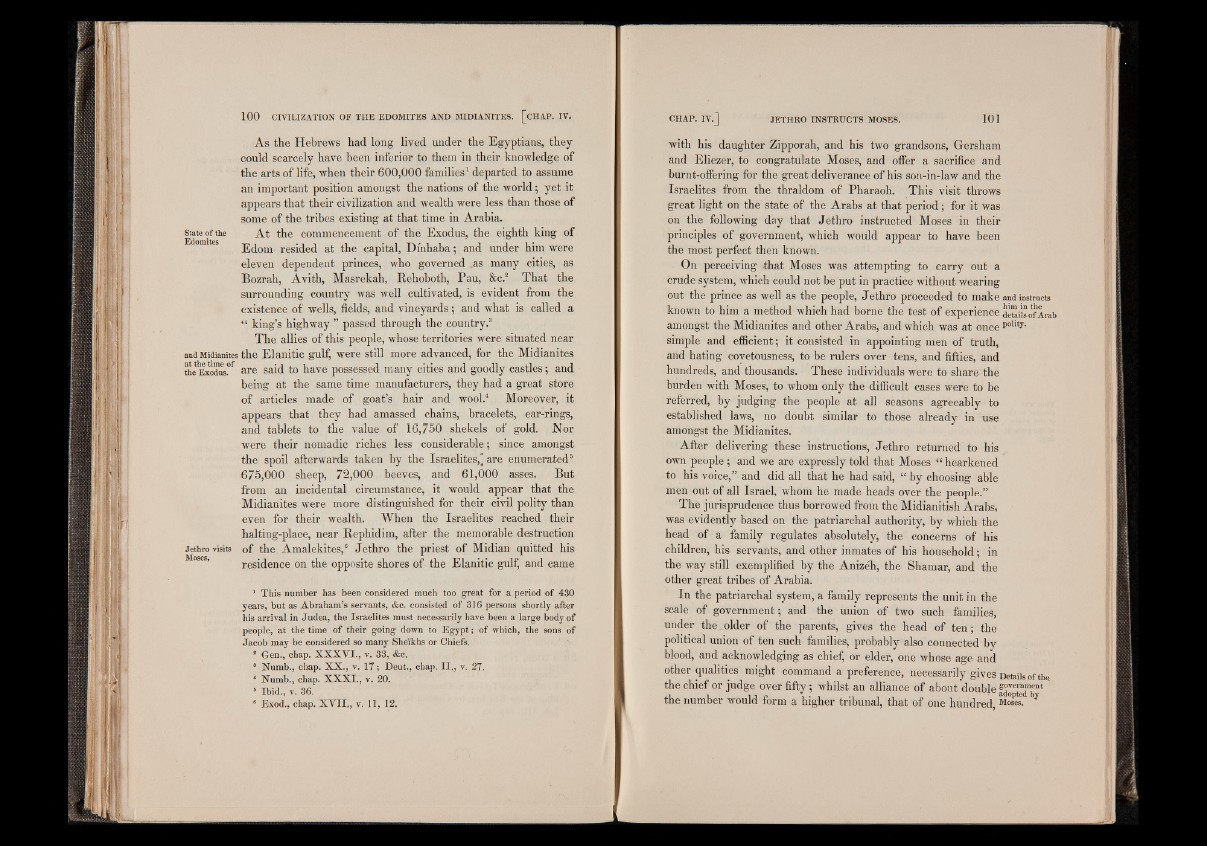
State of the
Edomites
and Midianites
at the time of
the Exodus.
Jethro visits
Moses,
As the Hebrews had long lived under the Egyptians, they
could scarcely have been inferior to them in their knowledge of
the arts of life, when their 600,000 families1 departed to assume
an important position amongst the nations of the world; yet it
appears that their civilization and wealth were less than those of
some of the tribes existing at that time in Arabia.
At the commencement of the Exodus, the eighth king of
Edom resided at the capital, Dinhaba; and under him were
eleven dependent princes, who governed .as many cities, as
Bozrah, Avith, Masrekah, Behoboth, Pau, &c.2 That the
surrounding country was well cultivated, is evident from the
existence of wells, fields, and vineyards; and what is called a
“ king’s highway ” passed through the country.3
The allies of this people, whose territories were situated near
the Elanitic gulf, were still more advanced, for the Midianites
are said to have possessed many cities and goodly castles; and
being at the same time manufacturers, they had a great store
of articles made of goat’s hair and wool.4 Moreover, it
appears that they had amassed chains, bracelets, ear-rings,
and tablets to the value of 16,750 shekels of gold. Nor
were their nomadic riches less considerable; since amongst
the spoil afterwards taken by the Israelites,] are enumerated5
675,000 sheep, 72,000 beeves, and 61,000 asses. But
from an incidental circumstance, it would appear that the
Midianites were more distinguished for their civil polity than
even for their wealth. When the Israelites reached their
halting-place, near Bephidim, after the memorable destruction
of the Amalekites,6 Jethro the priest of Midian quitted his
residence on the opposite shores of the Elanitic gulf, and came
1 This number has been considered much too great for a period of 430
years, but as Abraham’s servants, &c. consisted of 316 persons shortly after
his arrival in Judea, the Israelites must necessarily have been a large body of
people, at the time of their going down to E g y p t; of which, the sons of
Jacob may be considered so many Sheikhs or Chiefs.
! Gen., chap. X X X V I., v. 33, &c.
3 Numb., chap. X X ., v. 17; Deut., chap. I I ., v. 27.
4 Numb., chap. X X X I., v. 20.
5 Ibid., v. 36.
" Exod., chap. X V II., v. 11, 12.
with his daughter Zipporah, and his two grandsons, Gersham
and Eliezer, to congratulate Moses, and offer a sacrifice and
burnt-offering for the great deliverance of his son-in-law and the
Israelites from the thraldom of Pharaoh. This visit throws
great light on the state of the Arabs at that period; for it was
on the following day that Jethro instructed Moses in their
principles of government, which would appear to have been
the most perfect then known.
On perceiving that Moses was attempting to carry out a
crude system, which could not be put in practice without wearing
out the prince as well as the people, Jethro proceeded to make and instructs
known to him a method which had borne the test of experience details of Arab
amongst the Midianites and other Arabs, and which was at once poIity-
simple and efficient; it consisted in appointing men of truth,
and hating covetousness, to be rulers over tens, and fifties, and
hundreds, and thousands. These individuals were to share the
burden with Moses, to whom only the difficult cases were to be
referred, by judging the people at all seasons agreeably to
established laws, no doubt similar to those already in use
amongst the Midianites.
After delivering these instructions, Jethro returned to his
own people; and we are expressly told that Moses 1 hearkened
to his voice,” and did all that he had said, “ by choosing able
men out of all Israel, whom he made heads over the people.”
The jurisprudence thus borrowed from the Midianitish Arabs,
was evidently based on the patriarchal authority, by which the
head of a family regulates absolutely, the concerns of his
children, his servants, and other inmates of his household; in
the way still exemplified by the Anizeh, the Shamar, and the
other great tribes of Arabia.
In the patriarchal system, a family represents the unit in the
scale of government; and the union of two such families,
under the.older of the parents, gives the head of ten; the
political union of ten such families, probably also connected by
blood, and acknowledging as chief, or elder, one whose age and
other qualities might command a preference, necessarily gives Details o f the
the chief or judge over fifty; whilst an alliance of about double f^eraf“ent
the number would form a higher tribunal, that of one hundred, “S . by